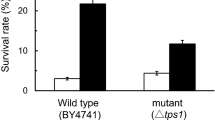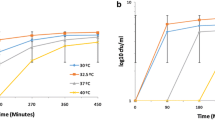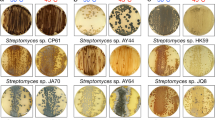Abstract
The effect of sodium azide in heat shock-induced cell death was studied in Debaryomyces vanrijiae, Candida albicans, and Saccharomyces cerevisiae yeasts. The results presented demonstrate that the azide addition induced a drastic decrease in the thermotolerance of glucose-grown D. vanrijiae. In contrast, glucose-grown S. cerevisiae and C. albicans cells treated with NaN3 became more resistant to heat shock than control cells. Nevertheless, in galactose medium the decrease of thermotolerance of S. cerevisiae and C. albicans cells was observed in the presence of sodium azide. It was suggested that the decreasing effect of sodium azide on thermotolerance takes place only when the yeast cell is incapable of using fermentation for ATP synthesis and obtains energy via oxidative phosphorylation.
Similar content being viewed by others

Author information
Authors and Affiliations
Additional information
Received: 27 December 2001 / Accepted: 27 February 2002
Rights and permissions
About this article
Cite this article
Rikhvanov, E., Varakina, N., Rusaleva, T. et al. Sodium Azide Reduces the Thermotolerance of Respiratively Grown Yeasts. Curr Microbiol 45, 0394–0399 (2002). https://doi.org/10.1007/s00284-002-3758-x
Issue Date:
DOI: https://doi.org/10.1007/s00284-002-3758-x



